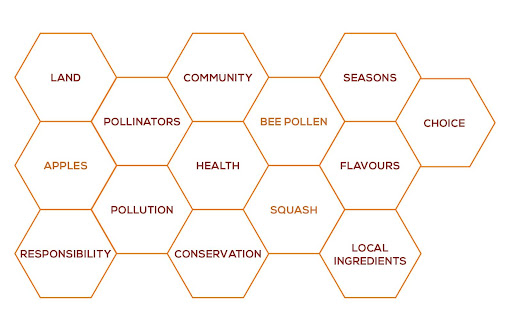Reason One: Concepts build expertise.
Expertise helps us remember, reason, and solve problems. The biggest difference between a novice and an expert is that the expert can identify the big concepts (significant ideas) in their discipline, understand their form and function, describe the patterns they follow, and connect the concepts to solve new problems (National Academies of Sciences, Engineering, and Medicine, 2018).
For example, let’s imagine a chef who advocates for sustainable farm-to-table dining. The chef has a deep understanding of the relationship between land, pollinators, community, health, pollution, choice, responsibility, conservation, seasons, flavours, and more, whereas a home cook is learning more basic relationships, like how to pair flavours together with local ingredients. Both are working with similar concepts, but the chef has a more sophisticated understanding and is able to transfer this understanding to novel, complex situations.
Reason Two: Concepts transfer with learners as they move and grow.
As a world on the move (or in a pandemic lock-down), concepts can be a connective thread as we learn multimodally in varying learning spaces and places (Erickson et al., 2017; Sigler & Saam, 2006; Murdoch, 2015; Paterson, 2010). For example, let’s say a child is learning that characters can be human or non-human. This understanding can be found in literature all over the world, so they will find evidence of this concept across multiple contexts over the course of their life.
Reason Three: Concepts are inclusive.
Regardless of age and stage, learners can choose topics of study related to the concept and still learn as a collective. Gone are the days of topic-based research projects where the person studying horses has nothing in common with the youth studying soccer. Instead, learners can connect their topic to a broader concept of Passion or Interest, or any other related concept. And students learn more about the concept because they are studying it from different vantage points!
Want to learn more?
My book offers a deeper dive into these reasons along with two more. Consider the Concept section alongside the cited sources for a more fulsome understanding of the role of concepts in instructional design for understanding and expertise building.
Erickson, H. L., Lanning, L. A., & French, R. (2017). Concept-based curriculum and instruction for the thinking classroom.(2nd revised ed.). Thousand Oaks, CA: Corwin Press.
Murdoch, K. (2015). The power of inquiry: Teaching and learning with curiosity, creativity, and purpose in the contemporary classroom. Northcote, Vic.: Seastar Education.
Paterson, M. A. (2010). Living inquiry as pedagogy (Master’s thesis). University of British Columbia, Vancouver, BC. Retrieved from https://open.library.ubc.ca/cIRcle/collections/ubctheses/24/items/1.0069060
National Research Council. (2000). How people learn: Brain, mind, experience, and school: Expanded edition Washington, DC: The National Academies Press.
Sigler, E. A., & Saam, J. (2006). Teacher candidates’ conceptual understanding of conceptual learning: From theory to practice. Journal of Scholarship of Teaching and Learning, 6(1), 118-126.
